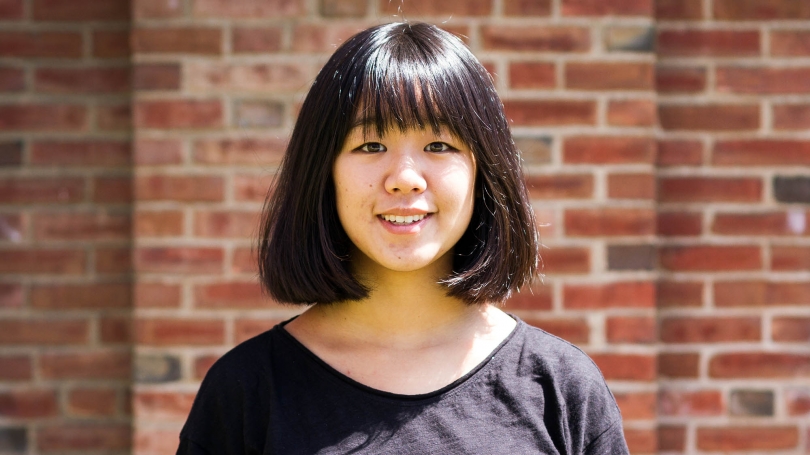
- About
- Consultation
- Programs
- Resources
- News & Events
Back to Top Nav
Back to Top Nav
Back to Top Nav
As a student studying both art and science, Amy Zhang ’17 often finds herself at the intersection of the two disciplines. Through her research, she hopes to find ways for artists and scientists to collaborate with one another to help improve the way the general public consumes important scientific data and findings.
Zhang, a biology and studio art double major and digital arts minor from New Jersey, is a 2015-2016 recipient of the Penelope W. and E. Roe Stamps IV Leadership Scholar Award. Her two-year project, titled, “Communicating Contemporary Biological Research Through the Visual Arts,” explores the relationship between scientific data and artistic illustration and looks at the disconnect between scientific research and public knowledge. Zhang’s faculty advisor is Lorie Loeb, a professor in the computer science department, director of digital arts, and executive director of the DALI Lab at Dartmouth.
Zhang recently spoke to the Web Services Content Corps Team about her project.
How did your project come to fruition?
Through my science classes, it’s come to my attention that a lot of the problems facing the scientific community center on the inability to communicate. We generate lots of scientific knowledge, data, facts, etc., in order to better inform everyday life, but there is a disconnect with the general public. Climate change is perhaps the big example of this issue. We have mountains of data proving global warming exists, but it doesn’t necessarily translate into action. I started thinking about how non-traditional methods of art that deal with how humans subjectively process information could collaborate with science.
Why does your project matter? How can others benefit from your research?
I think this topic is one that should definitely be explored. A lot of times the disconnect I spoke of comes about because there’s a separation between the humanities and the sciences. Even if it’s just physical buildings apart, people aren’t talking to each other. It’s when you combine those two types of knowledge that you can translate the information to the public.
Where and how have you conducted your research?
I’ve met with many different professors. I went to a workshop at Hubbard Brook which focused on visualization and sonification of big data. Through Stamps, I went on an art and biology trip to Puerto Rico. It was a week-long art-bio collaborative through an organization called Art+Bio Collaborative. I’ve also collaborated my research with Professor Lorie Loeb and the DALI Lab.
What is the biggest surprise or obstacle you have faced while working on your project?
I think the biggest shock to everyone is how much more time it takes, but I was more surprised about how my project ended up going in a different direction than I initially had planned.
How so?
I thought I would just sit in my studio and crank out some illustrations that had to do with science. But in the end, I spent a lot more time talking to people and developing my ideas. My project expanded from thinking about art as solely illustration of science to art as a collaboration with science.
What is the value of research and the value of experiential learning?
The ownership you have over your project. When it comes to classwork, you do it for the grade, or the professor, or your reputation. But when you’re doing your own research, you realize how much it has to matter to you for you to be able to put in the work.
What are your plans for after graduation?
I think we know what happens to plans—they always change. But I’d like to apply for the Reynolds Scholarship and do research somewhere abroad because I like fieldwork. I’m interested in going into media or animation to see how the industry works. This project has helped me see how the communication leverage points are at mainstream media outlets. That’s where you can change cultural values. I also want to go to graduate school and get a PhD in biology.
The Penelope W. and E. Roe Stamps IV Leadership Scholar Awards provide undergraduate students an opportunity to create and pursue their own experiential learning project. Each Stamps Scholar receives up to $10,000 over the course of their final two years at Dartmouth. Half of the funds come from Dartmouth, the other half from the Stamps Foundation.